C3: Connecting Coaches Cognition
A Podcast for the busy coach
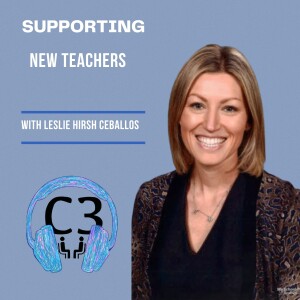
Thursday May 01, 2025
Thursday May 01, 2025
Episode Notes:
-Teacher, H.S. Administrator, worked for the State Department in Kentucky, and a middle and high school expert, and worked nationally with schools on instructional improvement and instructional leadership.
-Coaching Redefined Book- instructional leaders can have a guide book of how to set it up effectively and all of the components that go into it: growing yourself to growing your school and thinking of the culture of the school. It came from a desire to make it work and from real experience in a coaching and admin role.
-Intentional Instructional Moves Book- it sets up what classroom instruction should look like based on research and the intentional steps to get there. The audience is to teachers because they are the ones who will make these shifts. It is also powerful for admins or coaches, but it starts with the teacher shifts.
-Actions speak louder than words, teachers see what we are doing as coaches. We need to be humble in our position, and know we are all learners. We are not the people who know it all. Coaches can show that they are still learning too.
-Ask reflective questions. Have a listening tour prior to meeting with a teacher. Constantly ask questions, ask for feedback, and all the nuances in between. See the best in people as coaches.
-We need to believe in the teachers’ ability to grow constantly!
-Listening Tour - when schools try it, they think it is the best thing. It shapes the coaching within our school. A respectful approach to how we lead. It can change your trajectory in how teachers in your school see coaching.
-Get clarity around your role as a coach. See the website for questions to ask and the admin when entering that role. They understand the parameters and protocols within that role.
-Recognize the positive part of the instructional methods. There is a lot of research as to how individuals are recognized for their positive work, engaged deeper in the work, and is connected to retention. All is important for us in education right now. We need to recognize the positive things teachers do.
-Provide timely, honest, and consistent feedback.
-Honest conversations can go a long way. Critical conversations grounded in the third point of data can also be powerful.
-When we look back, we can remember which teachers believed in us, respected us, and loved us - and we know the ones who didn't. And for those who did, we would do anything in the world they asked us to improve.
-We need to have collaborative goals set with our teachers. Research shows that goals can bump our productivity from 11 to 25 percent. Think about that per classroom. A clear goal set with that teacher could make a huge impact. That has to be a collaborative goal.
-We need to differentiate as coaches for educators. If we expect teachers to model differentiation for our students, we also have to model that differentiated learning.
-Research shows that our walk-throughs should take between 3- 10 minutes. If the goal is right you will be able to see it in that amount of time. Sometimes we can spend too much time. Then they miss out on other classrooms. If we can get in more often but for less time we will see greater growth in those educators we are coaching.
-We have to be very intentional with our time and our feedback. We have to think about the small steps.
We have to be mindful of their next step, not necessarily where we want them to be. Those can at times be two very different places, but focus on the small steps. Think about not the end mark, but the next small step in that learning progression.
-Intentional Instructional Moves - it outlines those big concepts of effective instruction, and breaks it down to intentional steps, and a virtual guide to have all the resources for each strategy.
-Human growth and psychology research and podcasts can be helpful. Listen to the podcasts and it can impact your work.
-Take accurate notes- so we can see what we are doing so we can get where we are trying to go.
-Coaches are collaborators of content and that partner for growth, that understands teachers do not come to school as a blank slate. They have other things going on outside of the school. We all need the support of other humans.
-Embedded coaching has the largest impact on student learning. It is hard because it is so important. It is also equally rich and rewarding.
-Find yourself a community of coaches and latch onto them. It is how people see things they need to see within themselves.
Connect with Sherry:
-reflecttolearn.com - newsletter sign up there
-Twitter, Instagram & Facebook
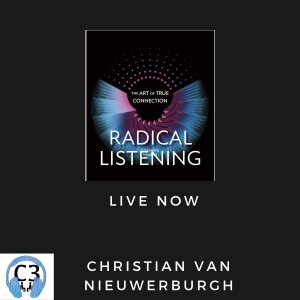
Thursday Apr 03, 2025
Thursday Apr 03, 2025
Episode Notes:
-Education is what Christian’s journey revolves around. “I am most passionate about education. I want to imagine a time when everyone has access to excellent education.”
That is what motivates him. He has reflected on how access to excellent education has impacted him, given him more opportunities, and his journey.
-Discovering coaching was a transformational moment for me. Coaching is the most respectful way to support people’s learning and professional development. And it's the most empowering way of doing that. Once I learned about coaching, there was no going back. My question became how can we use coaching most effectively in an educational setting. Then I learned the art of positive psychology which is the science of living or performance.
-As coaches we are supporting people to be at their best. By linking coaching, which is the methodology of helping others meet desired change, and positive psychology, which is the science of being at our best, we bring out the best in others.
Education gives us the tools to pursue our goals. It also helps us overcome barriers. Everyone needs a good education.
-There is something with each of us deciding what is the best contribution we can make. Some are amazing teachers… some are amazing leaders… Some are amazing support staff. Coaching matched my need to do well and my general approach to life. I love to see people succeed.
-Our jobs as coaches relate to other peoples’ successes.
-Radical Listening: THe Art of True Connection Book- Our job as coaches is helping others to be at their best.
-We hope the listeners are ensuring they are at their best.
-Radical Listening: Take what coaches already know and share it with a much larger audience. It expands to so many more professional roles that could be enhanced by better listening.
-One of my biggest strengths is that I am a learner and co-authoring with someone else can be such a remarkable learning experience.
-Connection to the C3 Podcast: Connecting Coaches’ Cognition, and the subtitle of the book is ‘The Art of True Connection.’ Listening is not reactive and it is actually proactive. We can use the skill of listening to connect with other people.
-Radical Listening- We see listening as a two way interaction.
-Work with each other in partnership to pull someone forward.
-In the moments that are the hardest to relate, reach out, and be able to engage can be the most powerful.
-Radical Listening Book is very practical. We are all good listeners already. We listen in empowering and powerful ways to others. Start with an intention. Imagine you are about to go into a scenario, take a moment to think, what is my intention in this conversation?
-3 Social Intentions: Connect, Appreciate, & Influences
-3 Cognitive Intentions: Understand, Solve, & Listening in Order to Learn
-Depending on our intention we listen in different ways.
-Solving is a trap- when they really want to be listened to, not find a solution.
-Notice barriers of our listening: What can get in the way of our listening to others? -Time? - Time Poverty -I know what is best in this situation? -Internal barriers or internal dialogue
-Quieting and Quietening - one of the skills to be a radical listener is to create an environment for the listening to happen, the other is to create an environment that is not full of distractions. Difficult in education but minimizing what we can and shielding the conversation. Trying to show the conversation is important for us.
-Skill that is challenging is interjecting. We think - don't just go quiet or not speak. Jump in and engage. It helps to build this sense of rapport. Some programs say to not do this, but if I don't respond to those big emotions it breaks the sense of being with the other person. It is all the nonverbals. It is a building of rapport.
-Build up the energy of the conversion by connecting with them. Finesse and optimal matching required with discernment.
-Making sure the way we are listening to the person helps us to best be most helpful for our conversational partner.
-All of us need to be careful that fidelity to the intervention does not get in the way of the best interest of the client. Finesse is needed. Put the client first. It is based on their belief that they know what is best for them.
-Radical Listening involves that we can listen to people in a way that builds rapport and relationships. And sometimes putting the relationship and rapport first can be really powerful. The message behind Radical Listening.
- Start by having dialogue. Unlock starts by trying to validate, understand and appreciate where you are coming from. Can learn from you. I hope it has a broader application as well.
-The motivation for this book is Radical Listening
Applies in a professional context but personal as well. Something you can do straight away. What is my intention for my next interaction I am going to have?
-Are you applying this to the most important relationship that I have? Sometimes in those relationships we have had for longer so we get into habits, we are not as intentional as we could be. These people deserve our full attention. How am I listening to my partner, my best friend, or my colleague?
-Listening in this way can have a transformational impact.
-Listening is the intervention. We don't have to listen so that other things happen. Listening is the first step. That's the thing.
-It is fundamental as humans to connect with one another. Allocate more time to listening.
-Radical Listening with our pets.
-Everytime we listen it is an opportunity for connection.
And sometimes we miss that opportunity.
-Children and listening and needing to be acknowledged.
-Coaching is about creating ideal environments for learning.
-What’s important is going on for you right now? And being interested in that. Not saying “What’s going on?” “How are you?” - Really caring beyond.
Connect with Christian:
-coachonamotorcycle.com
-@coachonamotorcycle - YouTube
-Barnes and Noble - Radical Listening
-Amazon.com - Radical Listening
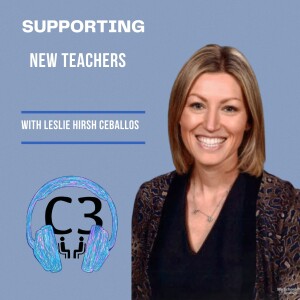
Thursday Mar 06, 2025
Thursday Mar 06, 2025
Episode Notes:
-Served in a wealth of roles within education from teaching, coaching, to administration.
-Contract work for curriculum companie and Senior Consultant for Learning Forward
-Mentoring Program through Learning Forward- a learning cycle with three parts. 1. Diagnose 2. Coaching Support 3. Monitoring Progress and Reflect
-The mentors only goal is to help the mentee grow professionally. You have to communicate effectively through listening, paraphrasing, questioning, and giving quality feedback.
-Work life balance and time management are two big factors that can be barriers for new teachers, as well as big behaviors.
-We can support and retain teachers through the use of a specifically assigned mentor. Also having a good, collaborative team can be a huge difference in morale and make you not feel alone in this difficult job.
-Monthly mentor/mentee check in meetings are also powerful in supporting our newest educators.
-This job does not get easier, you just get better - because you have more tools and resources in your toolbox.
-Establish strong and trusting relationships. Develop partnership agreements to foster that strong relationship- sets the purpose of the relationship.
-We assign mentors as soon as is possible. We want to be proactive in building that relationship and that they are part of a team and a culture.
-Mentor check ins - agenda - and tailor to strategic points in the year to ensure we are checking in and providing support. Your success is our success!
-Observation and feedback are essential to growing as an educator. Utilize SMART goals between mentor and mentee. Make it timely and attainable, so the mentee can feel that success in a timely manner.
-Coaching is a way to scale your impact, a way to impact more students through educators. Every educator needs a coach.
-If you could fix one thing about this situation, what would it be? If you could wave a magic wand and it would fix the hardest parts of this situation, what would it be? In a perfect world, what would this look like?
Connect with Leslie:
-X: @ldhirsh
-Learning Forward Consulting Services
-Mentoring New Teachers: A Learning Cycle Approach go to LearningForward.org —> Bookstore
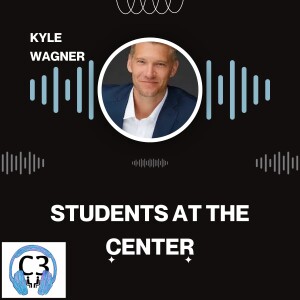
Thursday Feb 06, 2025
Thursday Feb 06, 2025
Episode Notes:
-High Tech High- PBL Based Leader
-International Educator to move from teacher focused to student focused learning.
-Moving from sage on the stage to the guide on the side. Where do you start? Look at the physical environment first. Eliminating the ‘front’ of the classroom and teacher desk, which changes the dynamics in the room. It makes any space in the room a learning space.
-Have students help in the redesign process around what their needs are, the environment dictates what the learning looks like. Shared decision making is pivotal.
-Giving voice and choice, involving the students within each portion of the learning process.
-Lead with questions- student generated or open ended?
-Encouraging student independence - it does not come overnight, structures need to be put into place over time.
-Project Based Learning - student driven - foster that level of independence with critical thinking with support and then slowly take some of those supports away.
-Make things highly visual in your classroom - even progression within learning.
-Classroom culture that encourages students to ask questions, explore, and find inquiry within their own learning.
-How do I set up an environment that fosters that type of inquiry? Work to gather and group questions together and gauge interest so you can structure accordingly. Start with the student at the center of the lesson.
-Don't lead with content, lead with inquiry. What is an open ended challenge you can present? What is meaningful to them? How can you scaffold their learning by addressing that inquiry?
-Rigor - having high expectations for student learning - have to teach them to not rely on us as much. It is not about jumping and checking boxes. It has to be led by wonder and inquiry.
-Try to eliminate teacher time in the front of the room. How can you reach the same end without the teacher being the main focus? Have students present their learning or share out. It is a great formative assessment.
-How can they articulate their learning in a way that is meaningful to them?
-Coaching means reaching your own identified personalized goals.
-A mentor or a coach will always be my saving grace in education. Reach out as you need someone to coach you through. Shift models are so important and have made a world of difference and have brought back the joy!
-Find your mentor or your coach. Every journey starts small, every journey starts with a single step. What will your first step be?
Connect with Kyle:
-Website - https://transformschool.com/ - this has resources, links, scorecards, blogpost, training, and his podcast.
-Email- kylewagner@transformschool.com
-LinkedIn - Kyle Wagner - reach out
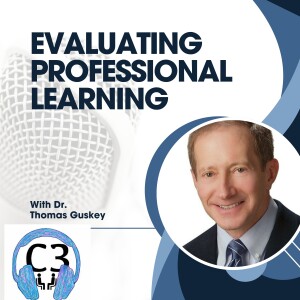
Thursday Jan 09, 2025
Thursday Jan 09, 2025
Episode Notes:
-Thomas has had a wealth of experience teaching middle school and high school. Then he went to graduate school at the University of Chicago. He worked with Benjamin Bloom. He has had the amazing opportunity to learn from such remarkable minds as this.
-We have to give credit to those brilliant people who came before us. Tom worked with Chicago Public School as a Curriculum Evaluator and the Director of Research and Development. Then he moved into a university position at the University of Kentucky.
-He realized he had not taught at the elementary level, so he took a leave from the university and went to go live that experience in her second grade classroom. It has had a profound influence on his work ever since.
-2024 Learning Forward Conference - Evaluating Professional Learning Experiences.
-Donald Kirkpatrick - Evaluating Programs in Business and Industry - 4 Levels of Learning Evaluation for Professional Learning in Business Industry
Participants reaction
Participants learning
How it impacted practice
How did it improve productivity?
-Built off this model with a fifth level- All levels are important, but yet, all are different.
-Organizational support and change - what is necessary to gain a high level of implementation?
-Active ongoing sustained support from building leaders.
-When you plan instructional learning, you have to start at level 5 - look at the evidence we have on student learning and find what improvements we want to make there.
-Begin with the end in mind - Covey
-If you plan well, evaluation takes care of itself.
-We need to recognize that there has never been significant improvement in education on any measure, in any level, in the absence of significant professional learning experiences offered to the educators you have involved. Not all professional learning is effective. But there has never been improvement with the absence of it.
-Need Surveys - Needs versus symptoms - analyze the situation well to address the true needs as opposed to symptoms.
-If you manage learning well, you do not have to worry about managing your learners.
-What evidence do educators most want to gauge their effectiveness as educators?
-Teacher Observation: Please don't watch me, watch my kids.
-Common Formative Assessment
-Bottom line - if my students didn't get it, it did not work, no matter how the educator ‘felt’ the lesson went.
-Whether or not it works is not defined by what we do, it is defined by what our students are able to do. What can I do differently? What else can I try?
-Teachers are the most dedicated professionals that I know, across all professions. They are dedicated to making a positive influence on their students.
-Ralph Tyler - Before you can teach anyone anything there are two fundamental decisions to make. What do you want them to know and be able to do? And you must decide what evidence you accept to verify they learned it.
-Success is tied more to motivation than anything else.
-Students persist at activities in which they can find success. (Think kids with video games).
-It has everything to do with success. Every time they play that video game. They have a chance to improve their score. They had another opportunity for success. They can be successful by following this process. If you show kids they can be successful, they will be. You have to build it in, really early. Build that success into everything we do! We all want success.
-How fast can you see results from a new approach, curriculum, or program? -Two weeks! If we do not see results in two weeks then teachers will be reluctant to continue and likely go back to what they know as tried or true from before. What can we see in two weeks?
-Coaches hold the key to give these individual educators exactly what they want to be successful with their students.
-Experience shapes attitudes and beliefs, changing the experience. There are direct relations between changes in student learning and the shifts in attitudes and beliefs of students. Show kids they can be successful learners, and they will believe in themselves that they are effective in the learning process. The same holds true in parents.
-Remember the Titans movie
Connect with Thomas:
-tguskey.com
-Learning Forward
-Education Week- regular blog
-guskey@uky.edu
-Twitter/x tguskey@gmail.com
-Phone number on his website
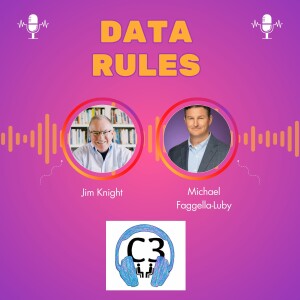
Thursday Dec 05, 2024
Thursday Dec 05, 2024
Jim Knight is a founding senior partner of the Instructional Coaching Group (ICG) and a research associate at the University of Kansas Center for Research on Learning. He has spent more than two decades studying professional learning, effective teaching, and instructional coaching.
Knight has written several books and his articles on instructional coaching have been included in publications such as The Journal of Staff Development, Principal Leadership, The School Administrator, and Teachers Teaching Teachers.
He directs Pathways to Success, a comprehensive, district-wide school reform project in the Topeka, Kansas, School District and leads the Intensive Instructional Coaching Institutes and the Teaching Learning Coaching annual conference.
Michael Faggella-Luby, PhD, is a professor of special education and core faculty of the Alice Neeley Special Education Research and Service (ANSERS) Institute at Texas Christian University. He is also a past president of the Division for Learning Disabilities (DLD) of the Council for Exceptional Children and an associate editor for the Journal of Learning Disabilities. His primary research embeds cognitive learning strategies into subject-area courses to improve reading comprehension for all levels of learners. He has received two national awards for his research, has written 59 scholarly publications, and has presented 90 sessions at national or international conferences.
–Impact Cycle- Universal model for change- Identify- Learn - Improve - ten years of careful study.
-Identify stage- Where you are? Where do you want to get to? And how are you going to get there?
-Improvement - Try things out and figure out what does and does not work. Data makes the invisible visible. Data tells you if you are on track or off track, it is your GPS through the coaching cycle for their learning.
-Data is data, there is no good data or bad data. Data tells us about student learning. Is the data somehow tied to professional learning? Data that is collected and chosen by the teacher. It helps to create that collective dialogue.
-The objective data could be around engagement, teacher to student talk, levels of questioning, or so much more. More heads analyzing the data is better than one. Keep making adjustments and improvements. Collect and review data frequently. Think about engagement or achievement.
-The data helped her see every student. No child was left behind.
-Big data - standardized tests can tell us who is consistently benefiting over time. Big data has a big view. Small data is the sweet spot. Teachers identify the data they want to collect to have those micro influences on the small data which can lead to changes in the big data over time. Small data can make a big difference.
-Engagement: behavioral engagement, cognitive engagement, or emotional engagement. All data is imperfect. Match your assessment methodology to the kind and level of learning you are wanting to see.
-A.I. and the ability for it to remember such huge quantities of information. It is good for specific tasks. Audio files of their teaching. ChatGPT is constantly evolving. It will always give you an answer but it may or may not be what you are looking for. It has enormous potential but it does have limits. It will never replace the teacher or the coach.
-Coaching is helping others unleash their potential. Coaching is also about keeping kids first and doing what is best for kids. Having an unmistakable positive impact on the lives of kids.
-A coach is saying I am right there with you. Just asking some questions helps you to be the very best of what you can be.
Connect with Jim and Michael:
-https://www.instructionalcoaching.com/
-@Jimknight99
-@strategicdoc
-https://coe.tcu.edu/about/faculty-staff/view/michael-faggella-luby
-jim@instructionalcoaching.com
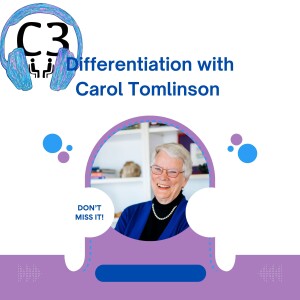
Thursday Nov 07, 2024
Thursday Nov 07, 2024
Carol Ann Tomlinson is William Clay Parrish, Jr. Professor Emeritus at the University of
Virginia’s Curry School of Education and Human Development. Prior to joining the faculty at
UVa, she was a public school teacher for 21 years. During that time, she taught students in high
school, preschool, and middle school, and administered district programs for struggling and
advanced learners. She was Virginia’s Teacher of the Year in 1974.
Carol was named Outstanding Professor at Curry in 2004 and received an All-University
Teaching Award in 2008. In 2023, she was #16 on in the Education Week Edu-Scholar Public
Presence Rankings of all university-based academics who are contributing most substantially to
public debates about schools and schooling. In that same list, she was ranked as the #4 most
influential voice in Curriculum & Instruction.
Carol is author of over 300 books, book chapters, articles, and other educational materials
including: (from ASCD) How to Differentiate Instruction in Academically Diverse Classrooms
(3rd Ed.), The Differentiated Classroom: Responding to the Needs of All Learners (2nd Edition),
and (with David Sousa) Differentiation and the Brain: How Neuroscience Supports the Learner-
Friendly Classroom. Her most recent books are: So Each May Soar: The Principles and
Practices of Learner-Centered Classrooms (ASCD, 2021) and Everybody’s Classroom:
Differentiating for the Shared and Unique Needs of Diverse Learners (Teachers College Press,
2022). Her books on differentiation are available in 15 languages. Carol works throughout the
United States and internationally with educators who seek to create classrooms that are more
equitable and effective for academically diverse students.
-Never intended to be a teacher, but ended up a middle school educator. Traveled and commuted with a friend who became her learning partner. She had a diverse range of needs within her classroom of 40.
-If we taught the whole class we were doomed, we needed to try something new.
-We wanted our students as our partners. They told us how to help them more, what they liked, what they disliked, and what we could tweak to make learning better. She remained in that school for 21 years.
-Differentiation -is a teaching model and it has to do with everything we do within a classroom and within schools.It can give us guidance to be better in every aspect of how we teach.
-Resistance is human. Our job is not to wallow in it but to circumvent it. Our job is to make this classroom better for whoever walks through the door that day.
-Coaching should not be a revolving door schedule. There is more opportunity when coaches deeply understand differentiation first and let go of their, “yes, buts…”
-Help a teacher move forward confidently and competently-Teaching is complex. A good leader needs to be a little ahead of the game.
-Aspire to get better in all elements of teaching- one element at a time.
-Voice and choice are important in their learning, they have things they can teach us. Use time and space and materials flexibility. We can reach out to connect children's experience, their experience and their knowledge.
-Show us that you know this, understand this and then can you show this, and can make a choice in how you show me. Make your choice in how you can show what you know.
-There are many ways to be able to reach out to kids. Putting students at the center of their learning and teaching. What about these students? It is helping them to take charge from there. Scaffolding is so vital to so many learners.
-Grace, the bottom line is grace, everyone in education needs to give themselves and each other grace every single day.
Connect with Carol:
Twitter-@cat3y
LinkedIn-Carol Ann Tomlinson
ASCD - Carol Ann Tomlinson
So Each May Soar: The Principles and Practices of Student Centered Instruction or Everybody’s Classroom
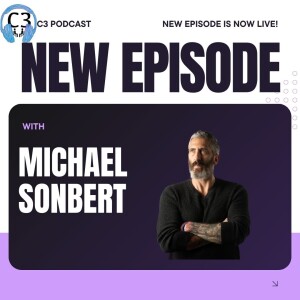
Thursday Oct 03, 2024
Thursday Oct 03, 2024
Coaching is intentionally building skills, showing and modeling best practices, and intentionally training people to be better.
-His work has been in some of the most difficult zip codes to work in. They see coaching in more of a model practice. They define clear directions.
-Sky Rocket Your Teacher Coaching (Skyrocket Education and Rebel Culture)
-Intentionally building the relationship, and finding out about them as a person, realizing there is an amazing human here. Their perceived resistance from this person was actually just them wanting to know how to get better and not liking conversations that felt cloudy, they liked straight talk. Knowing what works for people and what doesn't is needed. It is powerful being able to connect with people and have them trust you.
-Relationships are at the heart of our model.
-Expertise is something that builds relationships. When someone can put their trust in you. No teacher wants to waste their time. Relationships are built when one person feels like they are in very safe care with the other.
-Accountability, a promise that we make to each other, it is important, like any relationship. I can count on you and you can count on me. Shared expectations for success can be pivotal. Set those expectations to be able to hold each other accountable.
-We think of schools as high reliability organizations, like airlines or hospitals, when adults make mistakes people get hurt - short term or long term. To hold people accountable, we have to do that on the front end. Let's discuss what we previously agreed to.
-Shared accountability to maximize time.
-We need to commit to doing these things together, and then we can hold each other accountable. It can be the kindest thing you can do for someone.
-It is never too late to set shared expectations in a coaching cycle. What do you need from me to be successful? Or just start this in the next cycle.
-AI and coaching
-Coaching vs. support
-What is the problem you are trying to solve right now?
Connect with Michael:
-Skyrocketed.org or Rebelculture.com
-michael@skyrocketed.org or michael@rebelculture.com
-Instagram @michael.sonbert
-LinkedIn - Michael Sonbert
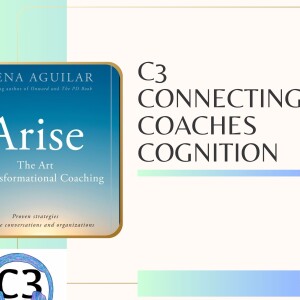
Thursday Sep 05, 2024
Thursday Sep 05, 2024
There is nothing more powerful that we can do, than knowing our own selves. When we know ourselves, we know how our past affects our present, and forms our vision for the future, and we are so much more empowered!
-Lonely and isolated, she entered into the profession feeling unsure of what she was doing. Belonging and acceptance was the core, as well as building community. That commitment continued in coaching, as a leader, and now as a facilitator of learning spaces. It is one continuous thread as a result of my experiences as a kid.
-I value that commitment to creating community as well as belonging and a sense of acceptance.
-I work from a way, the actions take help to build to reflect and the connection or community.
-I am aware of the fundamental need for psychological and social safety and connection.
-My commitment and vision in my work is to help people thrive. The core needs are belonging and connection.
-I have created a community in my life. Classroom community is everything. Feeling valued is everything.
-Knowing and Doing Gap - We know we want this but not sure how to make this a reality.
-Arise Book- Tell people exactly how to say this and what we do. We need granular instruction.
-We are humans, we get activated, we have emotions. My work comes in when we have to get very specific with people. Try this, say this, do that, shift these beliefs, explore this way of being that you may be acting from.
-Transformational Coaching Rubric: The rubric and model differs from traditional models as it is way more holistic. It encomapasses what it means to be a full range of what it means to be human working in schools both personally and professionally. The new rubric reflects the expansiveness of the model. It is intended to be a guide to cultivate their own growth and development. The rubric names what is most important.
-Cultivate your own responsiveness within the model.
-Emotional Intelligence?- Explore your why!
-Window of presence - indicators of emotional intelligence.
-How do we bring our past into our presence?
-How do we schedule ourselves? Physical movement between coaching sessions.
-Build trust and relationships as a coach.
-Resistance is fear.
-Empathy and compassion - activate
-Be appreciative and curious - build resilience!
-With resistance- build resilience and your perception of others. Let's find a place in ourse;lves where we feel compassionate!
-Let's be human with each other…
-What is possible? We can have conversations.. We can have real connections…
-Resistant vs. showing up defensively, because they are afraid.
-Let’s get curious. Empathy. Humility. Curiosity. Be Open.
-Cultivate awareness of yourself. Say things like “Am I getting this right? Can you help me to understand? I am appreciative of that!
-Strategies of resisting trust - always at stake- true honesty and courage. Repair trust
.
-Cultivate awareness of yourself, be compassionate and aware!
-Naming can be powerful.
-Be appreciative, curious and most importantly listening.
-Build resilience when the well seems low !- Let's start with your perceptions of others. Recognize resistance is fear and can we find a place in ourselves that is compassionate? Feelings of fear are the worst!
-Can we be human with each other?
-We need educational transactions, where there are partners and curiosity and compassionate.Let’s reflect on how we interact with one another. Let’s consider these possibilities
-What’s possible here and who cares? Who do I partner with? What is possible?
-Learning Library consists of skill sessions.
-Connect with Elena:
Twitter: @brightmorningtm
Podcast: BrightMorningPodcast
Website: https://brightmorningteam.com/
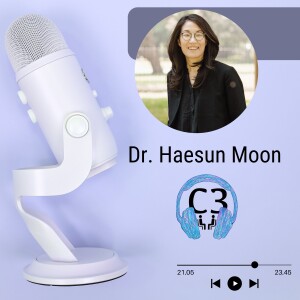
Thursday Aug 08, 2024
Thursday Aug 08, 2024
-Coaching is seeing a person who is carrying the weight of life, and finding their way. This model is so respectful. It is about people making progress and positive changes.
-Every industry needs coaching.
-An expert is the person who experimented and failed the most. Seeing people as the experts in their lives.
-Dialogic Orientation Quadrant ( DOQ) - organizes the content you are listening to. Its function is to map the conversation. Utilizing a time line and a preference line to map what you hear. Preferred future, resourceful past, troubled past, and dreaded future are the quadrants. Which quadrant do you want to grow?
-Coaching A to Zed - Extraordinary Use of Ordinary Words We use many of these words every single day to create that extraordinary shift.
-Rest as resistance
-Suppose that did change, what difference would that make for you? What do you want instead? Better to approach what we want, than avoid what we don't want. Let’s suppose instead of impose. Keeping the conversation anchored in reality.
-You don’t know. You don’t know, yet. What do you think would be useful to know? What can you do about it?
-Supposing and scaling questions. Ask how you get up to that number. It helps them to see their progress of how they have gotten to this number. How do we honor their existing progress while not pressing on for more?
-Coaching is curating, not narrating, but curating and co-authoring the preferred stories of our client's purpose, possibilities, and progress.
-What did I just hear the person say that they want?
Connect with Dr. Moon-
LinkedIn -Haesun Moon
https://www.briefcoaching.ca/hsm
A Podcast for the busy coach